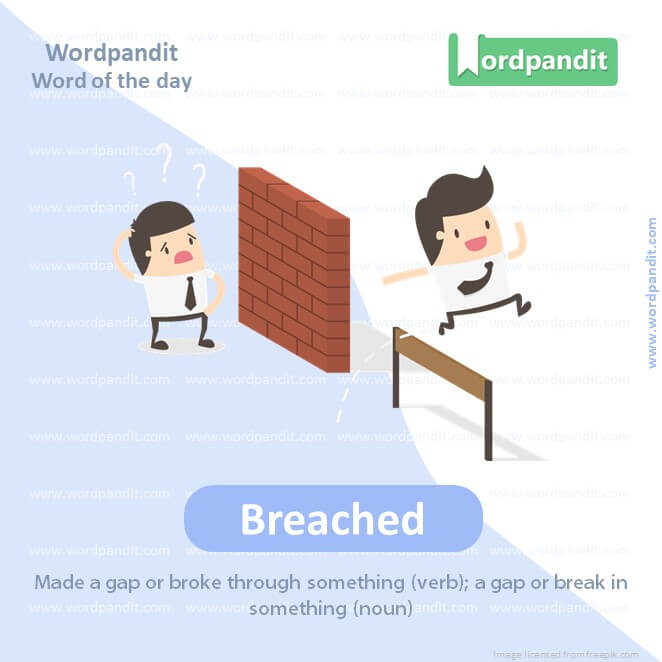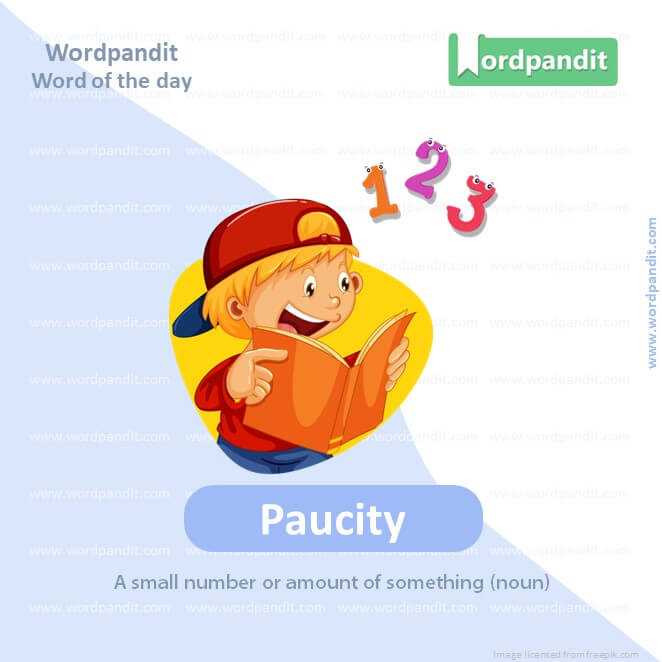Daily Vocabulary Words: List of Daily Used Words
Hi there. Welcome to this special section @ Wordpandit.
Our endeavour here is straightforward: highlighting important daily vocabulary words, you would encounter in The Hindu. This is your repository of commonly used words; essentially, we are posting a list of daily used words. Hence, this has significant practical application as it teaches you words that are commonly used in a leading publication such as The Hindu.
Visit the website daily to learn words from The Hindu.

WORD-1: Breached
CONTEXT: The South Lhonak glacial lake, formed from the gradual melting of a Himalayan glacier and located about 17,000 feet above sea level in north-western Sikkim, suddenly breached its embankments.
SOURCE: The Hindu
EXPLANATORY PARAGRAPH: Imagine you have a big wall made of bricks and someone makes a hole in it or breaks a part of it. That means they “breached” the wall. It’s like when you promise to keep a secret but then you tell someone; you’ve breached your promise.
MEANING: Made a gap or broke through something (verb); a gap or break in something (noun)
PRONUNCIATION: breeched
SYNONYMS: Broke, violated, ruptured, invaded, infringed, disrupted, intruded
USAGE EXAMPLES:
1. The dam was breached by the heavy rainfall.
2. The company breached the contract by not delivering on time.
3. The soldiers breached the enemy’s defenses.
4. After the breach in the wall, the animals escaped.

WORD-2: Stranded
CONTEXT: He has been coordinating the evacuation of some 3,000 tourists stranded in northern Sikkim by Indian Air Force choppers to the Pakyong Airport.
SOURCE: The Hindu
EXPLANATORY PARAGRAPH: Imagine you’re on an island, and you can’t get off because there’s no boat. You are “stranded.” It’s like when your toy car stops moving because its battery is dead; it’s stranded.
MEANING: Left alone in a place without a way to leave (verb)
PRONUNCIATION: stran-ded
SYNONYMS: Abandoned, marooned, isolated, stuck, trapped, deserted, beached
USAGE EXAMPLES:
1. After the shipwreck, they were stranded on a desert island.
2. The car broke down, and we were stranded on the highway.
3. The bird was stranded from its flock.
4. The heavy snow stranded many travelers at the airport.

WORD-3: Flippant
CONTEXT: “There should be a forensic probe by central agencies into the dam break. Before making flippant statements.
SOURCE: The Hindu
EXPLANATORY PARAGRAPH: Imagine someone making a joke when they should be serious. That’s being “flippant.” It’s like laughing during a quiet moment in school.
MEANING: Not showing a serious or respectful attitude (adjective)
PRONUNCIATION: flip-pant
SYNONYMS: Cheeky, disrespectful, irreverent, sarcastic, frivolous, sassy, offhand
USAGE EXAMPLES:
1. His flippant remark made her angry.
2. It’s not a time to be flippant; this is serious!
3. She gave a flippant answer to the teacher’s question.
4. Despite the gravity of the situation, he remained flippant.

WORD-4: Paucity
CONTEXT: Bela Trivedi and Dipankar Datta adjourned the hearing of activist and former JNU scholar Umar Khalid’s bail plea once again owing to the paucity of time.
SOURCE: The Hindu
EXPLANATORY PARAGRAPH: Imagine you have a box of crayons, but there are only 3 crayons inside. There’s a “paucity” of crayons. It means there’s not enough of something.
MEANING: A small number or amount of something (noun)
PRONUNCIATION: paw-ci-ty
SYNONYMS: Scarcity, shortage, lack, dearth, insufficiency, deficiency, sparseness
USAGE EXAMPLES:
1. There is a paucity of fresh water in the desert.
2. The team lost because of a paucity of good players.
3. There’s a paucity of evidence in this case.
4. Due to the paucity of funds, the project was halted.

WORD-5: Voluminous
CONTEXT: As the matter came up for hearing after six weeks, the Delhi police sought more time to file its reply, saying that the chargesheet was “voluminous.”
SOURCE: The Hindu
EXPLANATORY PARAGRAPH: Imagine wearing a big fluffy dress that has lots and lots of material. That dress is “voluminous.” It’s like having a huge book with many pages.
MEANING: Having a lot of space or content; very big (adjective)
PRONUNCIATION: vo-lu-mi-nous
SYNONYMS: Bulky, expansive, large, capacious, roomy, spacious, massive
USAGE EXAMPLES:
1. She wore a voluminous gown to the ball.
2. The library had voluminous records of the city’s history.
3. The voluminous clouds filled the sky.
4. He was known for his voluminous writings.
WORD-6: Recusal
CONTEXT: There is some difficulty on part of my brother.” Owing to Justice Prashant Kumar Mishra’s recusal without any explanation being recorded.
SOURCE: The Hindu
EXPLANATORY PARAGRAPH: Imagine a referee in a game where their own child is playing. They might step aside and not make decisions because it wouldn’t be fair. That act of stepping aside is called “recusal.”
MEANING: The act of stepping away from making decisions because of personal interest or bias (noun)
PRONUNCIATION: re-cue-sal
SYNONYMS: Disqualification, withdrawal, abstention, stepping aside, removal, renunciation, resignation
USAGE EXAMPLES:
1. The judge’s recusal from the case was necessary due to a conflict of interest.
2. Because of his close relationship with the CEO, he announced his recusal from the vote.
3. Recusal is an important aspect of maintaining fairness.
4. She considered a recusal after realizing her brother was involved in the case.
WORD-7: Abrogation
CONTEXT: Chief Justice D.Y. Chandrachud in the case relating to the abrogation of Article 370, which resulted in the revocation of the special status of the State of Jammu and Kashmir.
SOURCE: The Hindu
EXPLANATORY PARAGRAPH: Imagine you have a rule in your house that you can’t eat candy before dinner, but one day your parents say that rule is gone. They “abrogated” the rule. It means to end or cancel something officially.
MEANING: The act of officially ending or canceling something (noun)
PRONUNCIATION: ab-ro-ga-tion
SYNONYMS: Cancellation, annulment, nullification, revocation, repeal, termination, invalidation
USAGE EXAMPLES:
1. The abrogation of the treaty caused tension between the two countries.
2. Many protested the abrogation of the law.
3. The company’s abrogation of the agreement led to a lawsuit.
4. The community demanded the abrogation of the outdated policy.
WORD-8: Heinous
CONTEXT: No civilized person can forget the 1984 riots, and such heinous killings were politically motivated.
SOURCE: The Hindu
EXPLANATORY PARAGRAPH: Imagine a very, very bad act, like hurting someone on purpose. That act is “heinous.” It’s like the worst kind of naughty behavior.
MEANING: Extremely wicked or shockingly evil (adjective)
PRONUNCIATION: hay-nus
SYNONYMS: Atrocious, monstrous, abominable, vile, wicked, evil, nefarious
USAGE EXAMPLES:
1. The villain in the story committed heinous crimes.
2. The news reported a heinous act of violence.
3. Everyone was shocked by the heinous nature of the offense.
4. The judge said it was one of the most heinous cases he had ever seen.
WORD-9: Acquittals
CONTEXT: “The delay in filing charges and several acquittals in these cases show that the counterterrorism law.
SOURCE: The Hindu
EXPLANATORY PARAGRAPH: Imagine someone is accused of taking a cookie without permission, but later everyone finds out they didn’t do it. They are declared not guilty. That’s an “acquittal.” It means someone is officially said to be not guilty.
MEANING: Official declarations that someone is not guilty of a crime (noun)
PRONUNCIATION: ac-kwit-tals
SYNONYMS: Clearances, exonerations, discharges, releases, absolutions, vindications, exculpations
USAGE EXAMPLES:
1. The lawyer worked hard to secure the acquittals of his clients.
2. Despite the evidence, there were several surprising acquittals.
3. The public was divided on the fairness of the acquittals.
4. After many acquittals, he became known as the best defense attorney in town.
WORD-10: Humanitarian
CONTEXT: We’re ready to deploy the supplies as soon as humanitarian access through the crossing is established.
SOURCE: The Hindu
EXPLANATORY PARAGRAPH: Imagine someone who helps people, animals, or nature because they care a lot. That person is a “humanitarian.” It’s like when you share your toys with someone who doesn’t have any.
MEANING: Concerned with helping people and improving lives (adjective); a person who works to help others (noun)
PRONUNCIATION: hu-man-i-tair-i-an
SYNONYMS: Charitable, benevolent, altruistic, compassionate, philanthropic, kind-hearted, merciful
USAGE EXAMPLES:
1. The humanitarian efforts saved many lives after the earthquake.
2. She received an award for her humanitarian work in Africa.
3. The humanitarian crisis required immediate attention.
4. He was known as a great humanitarian who always thought of others.
Vocabulary English Grammar
Delving into the vast universe of language learning, the ‘Vocabulary English Grammar’ acts as a beacon, illuminating the path to mastery. This synergy of words and rules forms the quintessential framework of the English language. However, understanding ‘Vocabulary English Grammar’ in-depth requires a fine-tuned strategy.
First and foremost, understanding ‘Vocabulary English Grammar’ goes beyond only remembering rules and words. It involves learning how a word functions in a grammatical context. To achieve this, resources like textbooks, online grammar guides, and interactive language learning apps prove to be very valuable.
However, embracing ‘Vocabulary English Grammar’ calls for consistent practice. Adopting thematic learning, where you concentrate on a specific grammatical concept and the vocabulary related to it, can be particularly effective. Reading material like articles and books, or engaging with podcasts and films can provide a real-world context to these concepts.
The key to mastering ‘Vocabulary English Grammar’ lies in constructing sentences. Instead of memorizing disconnected words and rules, start framing sentences. This active application significantly bolsters comprehension and provides practical insight into how grammatical rules govern the use of words.
To truly excel in ‘Vocabulary English Grammar’, it’s important to seek feedback. Participate in language exchange platforms or conversation clubs. These platforms provide an opportunity to apply what you’ve learned and obtain constructive feedback on your progress.
In essence, understanding ‘Vocabulary English Grammar’ is a step-by-step process that requires thoughtful learning, constant practice, application, and proactive feedback. By embedding these techniques into your language learning routine, you can confidently navigate ‘Vocabulary English Grammar’. Remember, mastering ‘Vocabulary English Grammar’ is not about perfection, but about progression and communication. Each rule learned, each word comprehended, brings you closer to the fluency in your English language journey.











